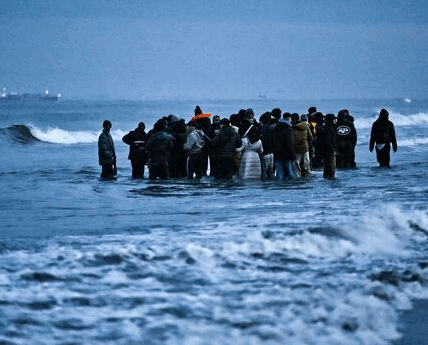Labour is set to make sweeping reforms to deter migrants from coming to the UK, reportedly taking inspiration from Denmark’s hardline policies.

The UK reportedly wants to emulate Denmark’s hard-line asylum model (Image: Getty)
Home Secretary Shabana Mahmood is expected to announce major reforms to the UK’s migration system in the coming days, with changes modelled on Danish border control. The Scandinavian country is frequently cited among the most hardline in Europe, after rule changes were enacted following the arrival of over a million people on the continent from the Middle East in the mid-2010s. Ms Mahmood is set to outline plans for deterring migrants from illegally entering the UK, and making it easier to deport those who do, in a statement to MPs on November 17.
Home Office officials have described the changes as “the most sweeping reforms to tackle illegal migration in modern times”. Indeed, Denmark’s hardline approach to disincentivising refugees – which has attracted criticism from organisations including the United Nations – could signal a shift to more effective UK restrictions. Significantly, Denmark recorded its lowest number of asylum applications in 40 years in 2024. But what kinds of changes might the government seek to bring in?

Shabana Mahmood is reportedly planning to model the UK’s migration policy on the Danish system (Image: Getty)
Temporary resident permits
Since the influx of asylum seekers around 2015, the Danish government has enforced a restricted temporary residence window, with permits only granted for one to two years at a time, with no guarantee of a permanent visa afterwards. When the country they came from is deemed safe, officials have the power to either withdraw or refuse to renew protection, no matter how long the person concerned has lived in Denmark.
Requirements for settling
Those who are granted permanent resident status have to clear a number of hurdles including fluency in Danish and proof of being in full-time employment for a number of years. Criminal offences can also reduce a migrant’s chances of settling in the country for the long term. Michala Clante Bendixen, who runs the advisory group Refugees Welcome Denmark, told The Guardian: “It’s about the attitude and feeling of being here as a visitor on a temporary basis. You don’t know what your future is going to be. Even a speeding ticket can push that permanent stay many years into the future.”
Tight family reunion rules
Labour is reportedly also eyeing Denmark’s restrictive rules on family reunions for those moving to the country, including its minimum age for spouse applications of 24, to protect against forced marriages. Both partners are also required to pass a Danish language test and the resident must be able to demonstrate that they have not claimed benefits for at least three years before their partner can join them.
Crackdown on “ghettoes”
Denmark’s crackdown on so-called “ghettoes” or “parallel societies” is one of its most controversial policies, allowing officials to knock down blocks of flats in areas judged to be populated by those of “non-western” backgrounds. A senior advisor to the European Court of Justice said the law amounts to direct discrimination on the basis of ethnic origin earlier this year, and those living in such areas are also not eligible for family reunion.
Focus on “repatriation” over “integration”
While Labour is unlikely to take as extreme an approach to the migrant crisis as its Danish counterpart, the shift to an approach inspired by the northern European state could mark a turn from an “integration”-focused immigration policy to “repatriation”, a “paradigm shift” steered by the right-wing Danish People’s Party over the last decade. A series of new laws effectively pivoted Denmark’s objective from integrating asylum seekers into society to repatriating them to their countries of origin after a temporary period of residency.
